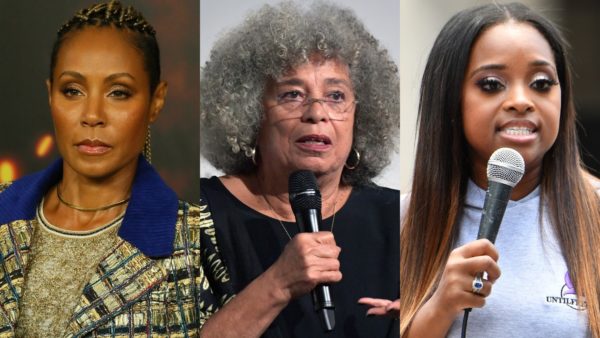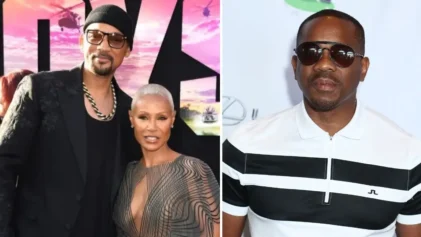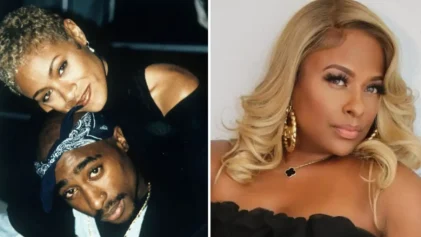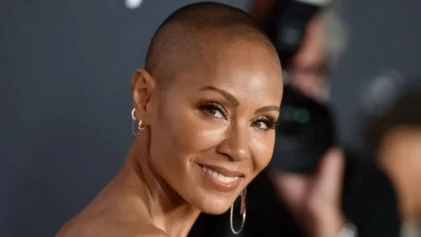Jada Pinkett Smith is known to tackle some of the day’s most discussed topics on her “Red Table Talk” series and the deaths of George Floyd, Breonna Taylor, and Rayshard Brooks are no different.
Pinkett Smith had Dr. Angela Davis on her show Friday, June 19. Davis is a famed activist, who was part of the Communist Party USA and affiliated with the Black Panther Party’s Los Angeles chapter. Davis gained nationwide notoriety following a courtroom shootout in 1970 when the 17-year-old brother of prison activist and Black Panthers member George Jackson used guns registered in her name to try to break his brother and other prisoners free during a trial. The trial judge, Jackson’s brother Jonathan, and one other person were killed during the melee, and Davis spent subsequently months on the run before being captured and acquitted of all charges in a 1972 trial. She’s also authored several books, including “Women, Race & Class” and is retried from teaching at the University of California, Santa Cruz.

Activist Tamika Mallory was also a guest. Mallory, who worked with Al Sharpton‘s National Action Network and was one of the principal organizers of the Women’s March organization before being forced to step down last year after attending a Louis Farrakhan event at which the Nation of Islam leader made incendiary remarks about Jews, has been a major voice during the current protests for racial justice, and she gave an impassioned speech at a news conference for Floyd last month that went viral.
Floyd, a Black man, died after a white former Minneapolis police officer pressed a knee into his neck for 8 minutes and 46 seconds while Floyd said he couldn’t breathe.
Mallory admitted that she didn’t watch the video of Floyd’s death, because she finds herself being paralyzed by the trauma of watching Black men die while in police custody.
“But I definitely heard him calling for his mother and when he says mama, it strikes a nerve because for my own son to have him say ‘Mama’ calling for me,” said Mallory about Floyd at the 31:33 mark. “But I think about Eric Garner saying I can’t breathe 11 times and people stood around and watched it happen and that’s what I see in this video.”
Garner was a Black man who died after a white officer from the New York Police Department used a chokehold while arresting him on charges of selling untaxed cigarettes in 2014.
Pinkett Smith added that she finds it hurtful that parts of society are scared of Black men.
The actress then mentioned Rayshard Brooks, a 27-year-old Black man who was shot and killed by an Atlanta police officer after Brooks grabbed his taser and pointed it.
Garrett Rolfe was fired from the Atlanta Police Department after the shooting and charged with murder. Another officer, Devin Brosnan, was charged with aggravated assault and oath violations.
“I think one of the most painful things for me is that the idea that Black men are the most dangerous creatures on the planet,” said Pinkett Smith with tears in her eyes.
“So that if he’s drunk in a drive-through at Wendy’s, that justifies him being murdered or everyone talking about whatever George Floyd’s rap sheet might have been, as if any of that has anything to do with his rights to be treated as a human being,” she added.
“Black men are demonized,” Dr. Davis said afterward. “The whole history of racism is full of images of the demonetization of Black men. But let’s not forget that Black women also suffer as a result of this racist violence. … As long as this violence continues to be afflicted on Black people no one is safe.”
Elsewhere during the discussion, Pinkett Smith asked Davis how effective inclusion and diversity are as weapons to fight racism. The panel also talked about other people besides Blacks being involved in the protests.
“I think it’s good we’re seeing so many white people in the street,” Davis explained. “But let me say why inclusion and diversity just don’t work, not by themselves. And it has to do with the fact that the powers that be are constantly seeking ways to de-radicalize our demands.”
“Every single university has an office of diversity and inclusion,” she added.”That simply means including Black people within a racist institution without ruining the structural racism out of the institution itself. Diversity and inclusion is okay but only when they’re paired with justice.”


